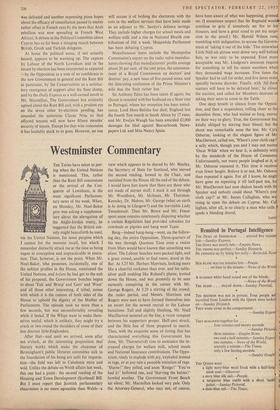Westminster Commentary
THE Tories have taken to jeer- ing when the United Nations is mentioned. This, rather than the Rent Bill concessions or the arrival of the Con- queror of Lewisham, is the most significant Parliamen- tary news of the week. When, on Monday, Mr. Noel-Baker Pere was asking a supplemen- tary about the abrogation of the Anglo-Jordan treaty, he suggested that the British sub- sidy might henceforth be used, via the United Nations, for some purpose which I cannot for the moment recall, but which I remember distinctly struck me at the time as being vague in conception and impracticable in execu- tion. That, however, is not the point. When Mr. Noel-Baker, who possesses, incidentally, one of the noblest profiles in the House, mentioned the United Nations, and before he had got to the nub of his proposal, the Government benches began to shout `Yah' and 'Brurp' and 'Geri' and 'Woor' and all those other interesting, if tribal, noises with which it is the custom of both sides of the House to uphold the dignity of the Mother of Parliaments. The episode took no more than a few seconds, but was uncomfortably revealing while it lasted. If the Whips want to make them- selves useful, which is unlikely, they might try a crack or two round the shoulders of some of their less discreet little-Englanders.
After that—and until we arrived, soon after ten o'clock, at the interesting proposition that literary works which make the chairman of Birmingham's public libraries committee sick to the foundation of his being are unfit for importa- tion—the field was left to Caledonia stern and wild. Unlike the debate on Welsh affairs last week, this one had a point : the second reading of the Housing and Town Development (Scotland) Bill. But I must report that Scottish parliamentary chauvinism is no more agreeable than Welsh—a view which appears to be shared by Mr. Maclay, the Secretary of State for Scotland, who moved the second reading, bowed to the Chair, and vanished from the House till the end of the debate. I would have him know that there are those who are made of sterner stuff; I stuck it out through Mr. Woodburn, Mr. McInnes, Mr. Thornton- Kemsley, Dr. Mabon, Mr. George (what on earth is he doing in Glasgow?) and the inevitable Lady Tweedsmuir. Then Mr. Bence and Mr. Fraser spent some minutes courteously disputing whether a certain Regulation had provided subsidies for cowsheds or pigsties and bang went Taper.
Bang—indeed bang-bang—went, on the follow- ing day, the entire Opposition. Three-quarters of the way through Question Time even a visitor from Mars would have known that something was afoot. The Labour benches were packed tight, and a great crowd, unable to find room, stood at the Bar. At 3.25 Mr. Herbert Morrison, looking more like a cheerful cockatoo than ever, and his sable- silver quiff nodding like Roland's plume,• trotted down the House, and was presently to be seen earnestly conspiring in the corner with Mr. George Rogers. At 3.29 a stirring of the crowd;• the ranks parted, and Messrs. Morrison and Rogers were seen to have formed themselves into an escort for the newest recruit to the Labour battalions. Tall and slightly blushing, Mr. Niall MacDermot teetered on the line, a victor rampant between his supporters proper. Half-past struck, and the little line of three prepared to march. Then, with the exquisite sense of timing that has characterised everything this Government has done, Mr. Thorneycroft rose to announce the in- creased charges for welfare milk, school meals and National Insurance contributions. The Oppo- sition, ready to explode with joy, exploded instead in rage, or at any rate a passable imitation of rage. `Shame!' they yelled, and anon 'Resign !"You've had it!' bellowed one, and 'Starving the babies!' howled another. The Government Front Bench sat silent; Mr. Macmillan looked very pale. Only the Attorney-General, who may not, of course, have been aware of what was happening, grinned on. (I sometimes suspect that Sir Reginald would continue to grin if somebody set fire to his trousers, and have a great mind to put my suspi- cion to the proof.) Mr. Harold Wilson rose, trembling with indignation, to accuse the Govern- ment of 'taking it out of the kids.' This somewha Little Nell-ish phrase went down very well behin him, as was only to be expected. Even mor acceptable was Mr. Lindgren's ominous reques for something to tell his union members whe they demanded wage increases. Five times th Speaker had to call for order, and five times order speedily became disorder. Finally, with 'All thes matters will have to be debated later,' he close the auction, and called for Members desirous o taking their seats to come to the Table.
One deep breath in silence from the Opposi tion, and then a stupendous, rolling cheer as th dauntless three, who had waited so long, move on their-way to glory. True, the Government hac kindly obliged by stirring their blood; but the shout was remarkable none the less. Mr. Cyri Osborne, looking at the elegant figure of Mr MacDermot, called out, 'Where's your cloth cap? a, sally which, though you and I may not mutter 'Oscar Wilde' when we hear it, is definitely wall by the standards of the House of Commons Unfortunately, not many people laughed at it, se Mr. Osborne repeated it. This time it receive( even fewer laughs. Believe it or not, Mr. Osborn( then repeated it again. For all I know, he migh' have gone on repeating it till half-past ten, bu Mr. MacDermot had now shaken hands with till Speaker and nobody could shout 'Where's you' cloth cap?' at Mr. James Callaghan, who wa rising to open the debate on Cyprus. Mr. Cal laghan, after all, is so clearly a man who calls spade a bleeding shovel.
TAP










































 Previous page
Previous page